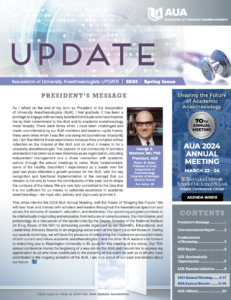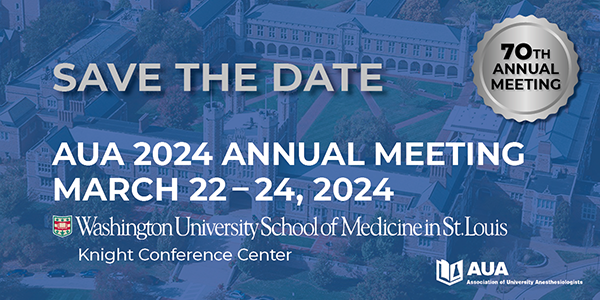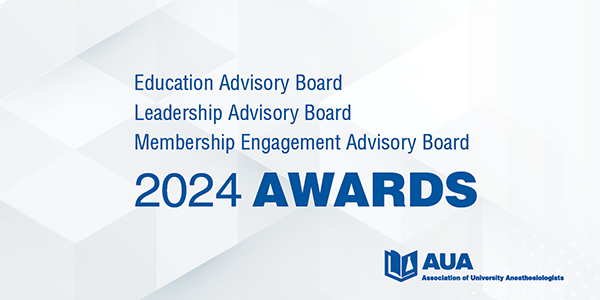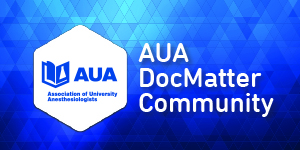Strategic Planning Process Underway to Map and Secure the Future of the AUA
On behalf of the AUA Strategic Planning Task Force, members: Vivian Abalama, IOM, CAE; Jeff Kirsch, MD; Dolores Njoku, MD; Monica S. Vavilala, MD; and Jeanine Weiner-Kronish, MD.
Starting in early 2021, the AUA Council engaged in a formal strategic planning process to chart the future course of the organization. One important goal was to ensure sustainability of the AUA within the dynamic community of academic anesthesiology.
In an experience parallel to many businesses and other organizations, the creation of a formal comprehensive strategic plan required thoughtful reflection on the past, and careful consideration of goals for the future. The process started with a series of three retreats held over the summer of 2021, attended by members of AUA Council, the AUA Advisory Board Chairs, and representatives from leaders in the Early-Stage Anesthesiology Scholars group. This series of meetings was led by volunteer advisors, Jeanine Wiener-Kronish, MD, AUA Past President (2016-2018) and Jesse Ehrenfeld, based on their great experience with similar processes in other organizations. The AUA Council also partnered with .orgSource, a commercial strategic planning firm that has worked with other academic medical societies. Some guiding statements for the AUA, as an organization, have been revised and these were approved earlier in 2021 by the AUA Council and the AUA membership.
The AUA’s Compelling Purpose is: Developing scholars, educators, practitioners, and leaders at the forefront of academic anesthesiology.
The AUA’s Mission is: To promote excellence in academic anesthesiology through mentorship; promotion of diversity and inclusivity; and professional growth throughout the careers of educators, academic leaders, and researchers.
The Vision for the AUA is: The advancement of academic anesthesiology as a dynamic specialty that makes substantive contributions to medicine, science, and society.
Additionally, the AUA Council recently approved the following three strategic goals for the AUA:
- Promote the development and mentoring of scholars, educators, practitioners, and leaders in academic anesthesiology.
- Foster and promote member engagement.
- Sustain and support the future of academic anesthesiology.
In September 2021, the AUA Council asked Monica Vavilala to lead the work of the Strategic Planning Task force. Since then and through a series of weekly meetings, the taskforce has been meeting weekly to advance this work. For example, a series of specific tactics are being developed for each of these goals. These tactics will be revised and updated on a regular basis and will both reflect ongoing activities for the existing committees and boards and provide an aspirational roadmap for expanding the AUA’s impact in the future. The AUA Strategic Planning Task Force is working to gather AUA member input and work with the AUA Council and Board chairs to refine and revise these tactics. As noted by the second strategic goal above, greatly expanded opportunities for AUA members to engage with the AUA are anticipated to emerge from this process. The AUA annual meeting has long been the primary event for member engagement, and producing the highest-quality annual meeting will continue to be an important part of the AUA. We have also seen great success of the recurring AUA webinars over this past year, as a member benefit. An emerging speaker-exchange program is also being developed, in which virtual presenters will be matched to institutions (including those underrepresented in academic anesthesiology) with need for speakers in their Grand Rounds series. In addition to being a benefit to members who volunteer to serve as speakers, this provides a great example outreach opportunity for the AUA.
The development of additional programs and possible expansion of AUA working groups to coordinate and facilitate additional offering and activities is anticipated as part of the strategic planning process. Having more AUA members, including junior members, engaging in the development and maintenance of these expanding programs is an opportunity for professional development and mentoring of AUA members. As additional tactics flow from the AUA’s revised strategic plan, we anticipate many more opportunities for AUA member engagement, hopefully in the context of a growing AUA membership as well. The net product of these programs with vibrant engagement of members will help to sustain academic anesthesiology, while promoting diversity and inclusion, as core values of the AUA.
Strategic planning is an ongoing process that requires continued work to ensure organizational alignment with the decided upon mission and goals. As part of this strategic planning process, AUA Councilors, AUA members and other stakeholders recognized the potential for overlap in programs and mission among other organizations and societies. In a new initiative, the AUA has started the process of roundtable discussions with other organizations focused on academic anesthesiology, including: the American Society of Anesthesiologists, the Foundation for Anesthesia Education and Research (FAER), FAER’s Academy of Research Mentors in Anesthesiology, the International Anesthesia Research Society, the Society of Academic Associations of Anesthesiology and Perioperative Medicine, Early-Stage Anesthesiology Scholars, and the recently-formed Anesthesia Research Council. The goal of this emerging dialogue is to improve strategic communication between these anesthesiology-based societies. In doing so, each should provide increased value for its members, by all being better able to achieve shared academic goals and decrease costs by reducing waste and redundancy.
In summary, this is an exciting time for the AUA. Significant organizational change may sometimes evoke a reaction of surprise from members. Expansion of programs and activities also will require much work to be done. However, this strategic planning process has revealed important insight and many opportunities. There is great potential for the AUA to emerge as a leading professional society that addresses timely and unmet needs of the broader community of academic anesthesiology. This effort will position the AUA for the future and assure that our specialty continues to have a strong and diverse base of remarkable leaders.











